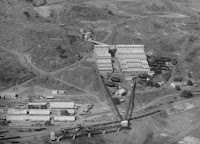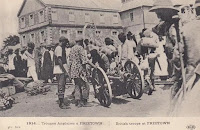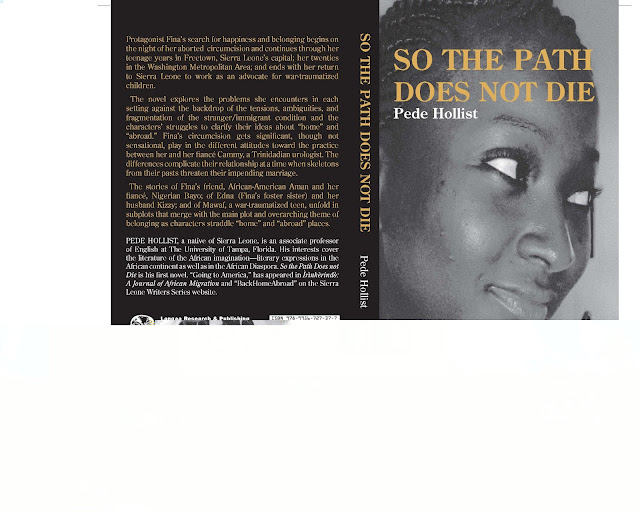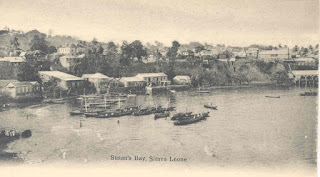Masimera in FiftySix | Fantasy History 7
Banja Tejan-Sie attended the Government Bo School in Bo, where his father
was an Arabic teacher. He also attended the Prince of Wales School in Freetown.
After his school days he worked as a nurse and matriculated as an external student in the University of London. He then went to Britain, where he entered Lincoln’s Inn and later the London School of Economics. He took an active part in student politics and held several offices at the West African Student Union in London.
Tejan-Sie was called to the Bar in 1951, returned home to Sierra Leone the same year and set up practice. He served as a member of the Bryan Keith Lucas Committee on Electoral Reform in 1954, and was one of the members of the Electoral Reform Committee in 1955.
After his school days he worked as a nurse and matriculated as an external student in the University of London. He then went to Britain, where he entered Lincoln’s Inn and later the London School of Economics. He took an active part in student politics and held several offices at the West African Student Union in London.
Tejan-Sie was called to the Bar in 1951, returned home to Sierra Leone the same year and set up practice. He served as a member of the Bryan Keith Lucas Committee on Electoral Reform in 1954, and was one of the members of the Electoral Reform Committee in 1955.
In the summer of 2000, Vitabu interviewed Tejan-Sie in London over several weeks. Born on August 7, 1917, Tejan-Sie died August 8, 2000, aged 83. He was the last governor-general of Sierra Leone.
Excerpts from the interviews appear in Fantasy History to enhance the backdrop on political events before and after independence in 1961.
It had been decided to hold a general lection in 1957. As vice president of the Sierra Leone People’s party, I was charged with responsibility of vetting candidates. This was a daunting task, as there were so many ambitious members, old and young, who were anxious to enter into politics or further their political ambitions.
There were quite a few old men who had already passed retirement, but still felt they could effectively serve the country. Some of them, like, S.G. Randall were selected merely because they were schoolmates of Dr. Milton Margai.
All the principal and main leaders had already had constituencies allocated to them. There was one – Masimera, to which I had decided to contest.
A few months before the announcement for a general election and during a reception, a white member of the Executive Council approached me. He called me aside and asked if Siaka Stevens, Sanusi Mustapha, and Albert Margai and I were friends. I told him I thought so. He then said that during the tea break, in one of the Executive Council meetings, he overheard Stevens, Margai, and Mustapha discussing me. They were complaining that Dr. Milton Margai was grooming me for the premiership if and when he retired, and that they must work together to prevent this happening. If this happened, their chances of influencing future policy might be in doubt.
I had already made it known that I would be standing for election in Masimera chiefdom, where my grandmother and mother were born.
To my surprise, at one of the regular meetings of the candidature committee, Siaka Stevens announced he had decided to stand in the same constituency because he had spent many years working as a trade union leader at the Marampa mines. This was in fact true, but I felt this did not qualify him to challenge another senior member of the party, when other safe constituencies in Freetown and in the Moyamba district had been suggested to him. It was also the policy of the party to distribute seats and constituencies according to tribe. I was a northerner and he was a southerner.
I asked Albert Margai to intervene as he chaired this particular meeting. His intervention was lukewarm. He suggested however that a committee of two – Constance Cummings-John and a Mr. Wright – should go to Marampa on a fact-finding tour to discover the view of the electorate. They returned with no recommendation. Meanwhile, Stevens had got some activists in the Executive Committee to attend a meeting called by Albert Margai to decide the candidature of Stevens and me. We both put our arguments before the meeting, but when the votes were cast Stevens got a majority of six.
During the meeting no love was lost between Sanusi Mustapha and me, as a torrent of abuse passed between us.
I had, before this meeting, appealed to Dr. Margai to intervene. He refused. I was so disappointed with the doctor’s attitude that I resigned as vice president of the party and declared myself an independent candidate in spite of the committee’s decision. Dr. Margai kept communicating with me through a third party. I thought he should have come out in the open.
Stevens had the support of the southerners in the mining company in Marampa. I had the full support of Paramount Chief Bai Koblo, the area chief, and the rest of the chiefdoms in the region who were solidly behind me. Lunsar, because of the large immigrant population, was key.
I lost by 160 votes.
This came about because Stevens claimed he was Limba and one of the chiefdoms in the district was mainly Limba. After the elections, it also came to light that Stevens and his supporters had paid cash and given all manner of gifts for votes. There was intimidation among the mineworkers and other malpractice.
I instituted an election petition in the court, with the support of Paramount Chief Bai Koblo, The petition was successful and Stevens’s election was declared invalid. The matter did not end there. I still had to fight a bye-election.
About this time, Wallace Johnson and C. B. Rogers-Wright had formed another political party, under the leadership of Cyril Rogers Wright in July 1954. It was called the United Progressive Party (Daily Mail, July 14, 1954).
The Creole population in Freetown and its environs had inspired the UPP. They were able to secure a few seats during the election but their leaders, Rogers Wright, did not have one.
When the seat in Marampa Masimera became vacant Rogers Wright was nominated by his party to contest it. Rogers Wright and his supporters bought tons of rice, bicycles and other goods, which they gave away to bribe the voters.




Comments
Post a Comment